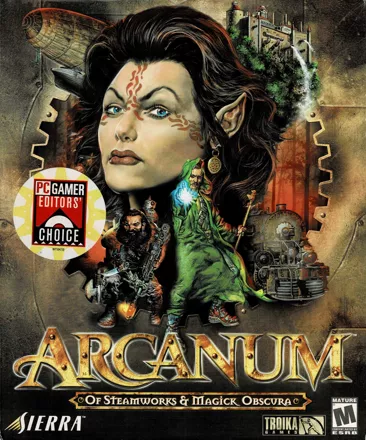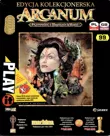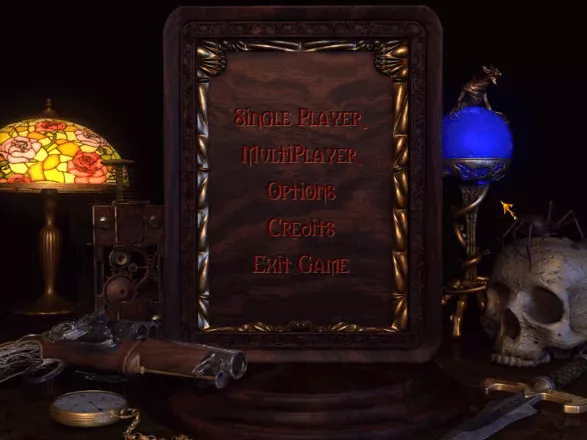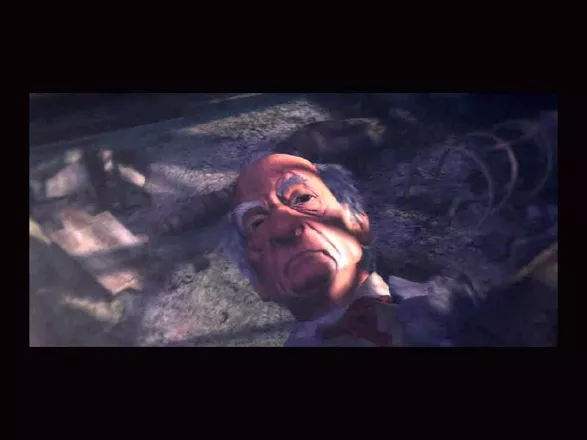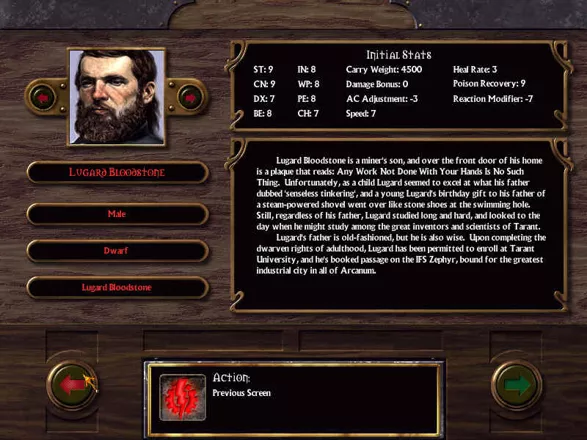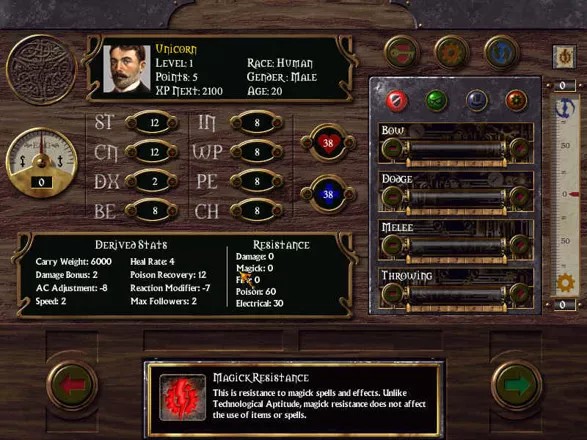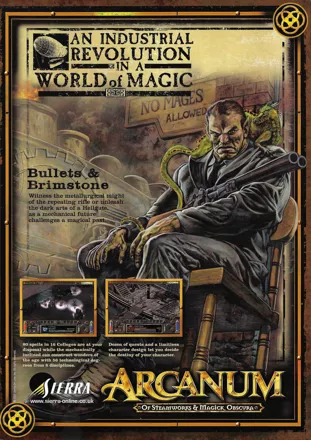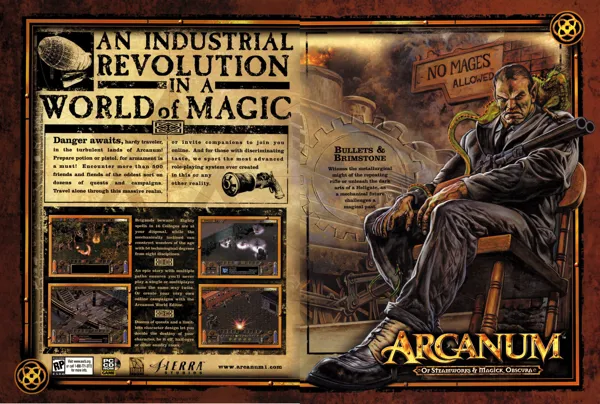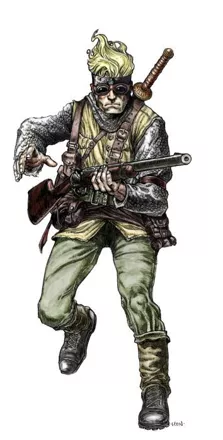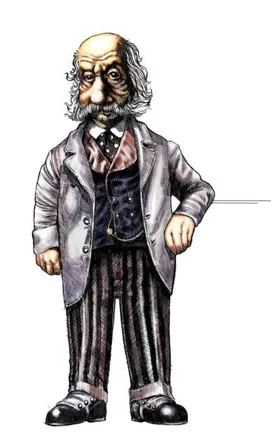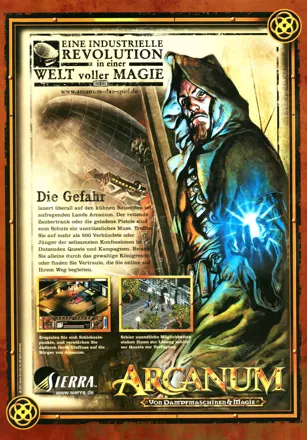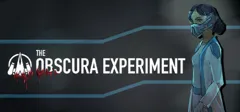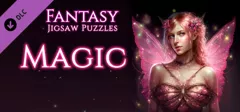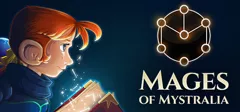Arcanum: Of Steamworks & Magick Obscura
Description official descriptions
The luxury zeppelin IFS Zephyr begins her maiden voyage from Caladon in the Kingdom of Arland to Tarant, one of the largest cities in the technologically advanced Unified Kingdom. Suddenly, while the zeppelin is cruising over mountains, two monoplanes attack it and eventually shoot it down. The two half-ogre attackers die in flames along with all their victims except two who miraculously survived. However, one of them, an old gnome, is mortally wounded. Just before he dies, he gives a silver ring to the other survivor and tells him to "find the boy". The witness of the crash, a man named Virgil, declares that the now only survivor is "The Living One", a reincarnation of a deity, and offers to follow him wherever he goes. The hero begins a long and perilous search for the mysterious boy, the origins of the silver ring, and the unknown enemy who was behind the attack on the zeppelin.
Arcanum is a role-playing game similar in concept and many gameplay principles to Fallout. It is set in a unique world, which can be described as mixture between Tolkienesque fantasy, steampunk technology and elements of British and North American culture of the 19th century: dwarves may carry molotov cocktails, and a half-orc protagonist can travel by train between Victorian-like cities. Magic and technology are opposed to each other; most humans and dwarves embrace technology, while some elf clans stick to the old ways and consider scientific progress evil.
In the beginning of the game the player creates the main character, choosing from a variety of races, attributes, magical or technological disciplines, social skills, backgrounds, etc. When the character levels up, the player can increase his main parameters as well as any available skills. Like in Fallout games, the player directly controls only one character; however, companions who join the party may be given orders, and their inventory can be managed by the player.
The game is open-ended: the player is free to explore the vast world from the onset, undertaking a large amount of side quests or following the main story. Social interaction plays a significant role: depending on the player character's charisma and intelligence attributes, as well as persuasion skill, many problems can be solved in a non-violent way. The amount of companions willing to follow the protagonist also depends on the latter's charisma rating; companions may also leave the party if they disagree with the hero's behavior.
The player can select one of the three combat modes for the game: real-time, turn-based, and fast-paced turn-based. Turn-based mode is similar to the combat in Fallout games: characters require action points to move, attack, or cast spells.
The game includes an editor called WorldEdit, which allows players to create their own maps, campaigns, and non-playable characters. Objects from the base game can be carried across to the player-created scenario. The scenery editor allows players to create their own objects. It is also possible to set and change game variables, i.e. the amount of skill points required to perform a specific task.
Spellings
- 奥秘:技术与魔法 - Chinese spelling (simplified)
Groups +
- BestSeller Series (Cendant / Havas / Vivendi Universal) releases
- Fantasy creatures: Dwarves
- Fantasy creatures: Elves
- Fantasy creatures: Gnomes
- Fantasy creatures: Halflings / Hobbits
- Fantasy creatures: Orcs
- Gameplay feature: Alchemy
- Gameplay feature: Brothels
- Gameplay feature: Character development - Skill distribution
- Gameplay feature: Gambling
- Gameplay feature: Karma meter
- Gameplay feature: Multiple endings
- Middleware: Bink Video
- Physical Bonus Content: World Map
- Protagonist: Female (option)
- Sound engine: AIL/Miles Sound System
Screenshots
Promos
Videos
Add Trailer or Gameplay Video +1 point
See any errors or missing info for this game?
You can submit a correction, contribute trivia, add to a game group, add a related site or alternate title.
Credits (Windows version)
157 People (118 developers, 39 thanks) · View all
| Project Leader | |
| Lead Programming | |
| Programming | |
| Design | |
| Animation | |
| [ full credits ] | |
Reviews
Critics
Average score: 79% (based on 61 ratings)
Players
Average score: 4.0 out of 5 (based on 168 ratings with 13 reviews)
An Enriching Yet Ultimately Flawed Experience
The Good
Let me preface this review by admitting that my relationship with Arcanum is... strained. It has taken me multiple attempts at playing the game over a period of nearly seven years finally to muster up the will to play the game to its conclusion. Perhaps this difficulty stems from a case of excessively impossible expectations on my part. Ever since I first read a preview of the game in late 2000, I had incredibly high hopes for the first CRPG by (the now defunct) Troika. After all, Troika was founded by the creative masterminds behind Fallout, perhaps my favorite game of all time, and the company's maiden voyage into the realm of PC role-playing seemed destined for greatness. It promised all of the elements that had made Fallout such a legendary game: a uniquely interesting game world, an intuitive and deeply flexible “classless” character creation system, and tactical turn-based combat should my in-game actions necessitate armed conflict. Even after receiving my preordered copy in late 2001, I was still unable to play the game for a few months due to a lack of free time to commit to such a massive RPG. Nevertheless, I found myself glossing through the game's massive manual, elaborately envisioning what sort of character I was going to create when I finally got the chance to venture into the world of Arcanum. It was just short of borderline obsession with a game I had yet to install on my computer's hard drive.
Perhaps it was simply inevitable, then, that my actual experience with the game fell far beneath my lofty expectations. Regardless, there remains a definite conflict within me as to just exactly how I feel about Fallout's half-brother, and this review is partly my own attempt to reconcile that conflict. At its core, I find Arcanum to be a mind-boggling mix of ingenuity and mediocrity, a rather peculiar blend that manages simultaneously to please and to repulse the gaming palate. Out of respect for my younger self's initial optimism for this “unique” RPG (not to mention the requirements of the MobyGames review format), let's start with the appealing elements of the game.
There are certainly plenty of things that Arcanum does right. First and foremost, the game world – or at the very least its premise – is one of the more appealing and well-conceived settings in any RPG period. Like Fallout before it, the world of Arcanum is highly innovative: a steampunk setting based on the real-world circa 1885 mixed with Tolkienesque high fantasy, elves and all. It is a world of conflict (and what good setting isn't?), but this conflict is more ideological than anything else. Technology – Victorian-era devices such as the steam engine and the locomotive – has revolutionized the world, and the old order of feudal kingdoms, chivalrous knights, and eccentric wizards is giving way to what one in-game personality loosely refers to as “pistol-brandishing cowards.” Of course, the technological-magickal conflict has a physical element as well: the two forces do not mesh, causing direct conflict not only between the forces themselves, but also between their respective adherents. Powerful mages are denied passage on trains due to the possibility of malfunction, there is animosity between the magickal elves and the tech-minded dwarves, and healing magicks have little to no effect upon those who practice technology. Even if it is not implemented as well as it could have been, the ideas such as these behind Arcanum's setting stand as a testament to innovation in game design.
Also like Fallout, Arcanum possesses a deep and flexible character creation system. In fact, Arcanum's system is quite possibly the most in-depth and intricate system I've ever seen, providing an unprecedented amount of freedom for players to create the kind of character they want to play. Want to be the best fighter ever to walk the land of Arcanum? Build up your Strength, Dexterity, and Melee and Dodge skills. Aspire to be the greatest, most feared necromancer who ever lived? There is a bevy of spells to choose from. Simply wish to dabble a bit in both roads to power so as to maximize your ability to get rich? Balance your skill point distribution among select spell colleges and technological disciplines as you see fit. The number of combinations of skills and attributes – not to mention special character backgrounds that provide both a special benefit and a drawback – is ridiculously high. Of course, it would be easy to feel a bit overwhelmed by such a daunting number of options (more on that later), but to those who invest the time and effort, the character system is one of the best ever devised.
Of course, the most skillfully crafted settings and characters mean nothing without a compelling reason to explore them. Fortunately, Arcanum delivers in this area as well, starting players off with an intriguing action-filled beginning that provides a definite adventure hook. The zeppelin on which the player's character is riding is gunned down, and the only other survivor dies shortly after giving the character a mysterious ring and instructions to “find the boy.” The player is then informed by a bystander – a neophyte religious devotee – that he is the reincarnation of an ancient elven deity. Shortly thereafter, mysterious assassins begin targeting the player. The opening is a magnificent call to adventure, and despite its propensity for disappearing for extended periods of time, the main storyline is highly compelling. It touches on a number of robust issues, from the costs of technology and resource usage, to race relations, to the philosophical implications of death and banishment. Though several key plot points are eventually dropped or forgotten, there can be no denying that the tale woven by the designers is if nothing else a wonderfully fitting excuse to explore and adventure in a strange new world.
The Bad
Though the creative elements of Arcanum are mostly praiseworthy, the technical elements (i.e. the gameplay) leave a terrible aftertaste. For every ingenius design decision as far as setting, character flexibility, and so on, there is an equally bafflingly terrible decision in the implementation thereof. I'm not quite sure whether this is better described as Newton's third law of gaming or as Murphy's law of gaming, but the fact remains that there are just as many (if not more) things that Arcanum does wrong as it does right.
For starters, the combat system in Arcanum just plain sucks. Why the designers of Fallout, which had one of the best RPG combat systems ever, were unable to implement something better than this is beyond me. The biggest contributor to this lackluster gameplay element is the fact that combat can be run in either turn-based or real-time mode, as Sierra insisted that the game not be solely turn-based for marketing reasons. On the surface, this appears to be yet another way of providing choice to the player, but such a choice is ultimately deceiving. Instead of being tactically sound like Fallout's or strangely addictive like Diablo's, Arcanum's combat systems are horrible shadows of the ones in those games. Combat becomes tedious, ridiculously easy, and flat-out pointless very quickly, as enemies seldom do anything other than charge into melee with the character. This battle conundrum is certainly due to the fact that it is difficult enough to balance a single combat system; trying to balance two separate ones within the same title is a near impossibility.
This lack of balance is without a doubt the game's biggest issue, not only in combat but in all aspects of the design. A lot of this problem comes from the designers' sheer ambition in providing unprecedented freedom in character development. There are so many things to choose from that it's simply impossible for all of them to be equally useful and/or represented in the game world. Some skills are useful maybe once in the entire game, while others (such as Melee and Dodge) are practically indispensable. In fact, pure melee characters have an almost ridiculously easy time with their adventure in Arcanum, due to the fact that experience is gained not for defeating an enemy, but rather for each successful attack. Melee characters thus level up at an alarmingly fast rate, and therefore obviously have a distinct advantage – a fact that even the game's manual is quick to admit. Other character types have a much more difficult time of things. “Hybrid” characters? Forget about it. Sure, they CAN be played, but the game is so ridiculously unbalanced against them that it's not advisable. Such is the double-edged sword nature of open-ended “free” game design, I suppose.
There is, however, ample evidence of a lack of polish and sufficient care in crafting the game that leads me to believe that there were certainly just plain bad decisions made in the game's design. Many gamers have often cited the outrageous number of bugs – not only in Arcanum, but in every game that Troika ever made – as a major drawback. There are definitely quite a few annoying bugs; I had issues with a random memory leak that slowed animations to a near crawl, as well as the fact that the game would fail to reset my display's brightness upon exiting the program, leaving my desktop a strangely luminescent white color until I manually went back in and reset it. There was nothing game crippling, but the bugs were annoying nonetheless.
The bugs, however, are minor compared to the overall lack of quality control that plagues Arcanum. Aside from the usual underdeveloped areas, quests, and NPCs (especially late in the game), there are many things that happen in gameplay that simply don't make any sense. For example, right before confronting the Schuylers about their dealings, I recruited the dwarven tech specialist, Magnus, who also had a beef with them. Without spoiling anything, I will simply say that Magnus and I decided to put an end to them, and emerged victorious in combat. Magnus thanked me for siding with him and permanently joined my party. Months of game time later, however, I asked Magnus to wait for me for a few minutes while I took care of a minor quest in one of the game's towns. When I asked him to rejoin me less than five minutes of real time later, he angrily refused. “Wait a minute,” he exclaimed, “you've been off making friendly with those Schuylers behind my back, haven't ye?” Umm, no Magnus, we killed them about nine months ago in game time, remember? Weird scripting errors like this one litter the game world. Characters remind me of things that we never talked about previously, I am given dialogue options detailing things that have never been mentioned in the game, and so on. While a few instances of this sort of thing are to be expected in any game of this magnitude, the sheer number of such errors in Arcanum falls just short of offensive.
The Bottom Line
I'm still not quite sure what to think about Arcanum. On the one hand, it's extremely appealing and outstanding; on the other, it's maddeningly inconsistent, poorly actualized, and sadly mediocre. Perhaps the best way for me to sum up Arcanum is as an ambitious failure, a flawed experience that is nevertheless appealing. I have made no secret of my mixed feelings toward this once-promising game, but after seven years and numerous playthrough attempts, I can finally say that this game has been an overall positive experience for me. This game certainly doesn't hold a candle to the upper echelon of CRPGs like Fallout or Planescape: Torment. Due to its incredibly unique and immersive world, though, it is still worth experiencing and enjoying – if its faults can be overlooked, that is. If you admire it for what it's trying to do and what it represents instead of what it ends up doing a lot of the time, you will find that it's a gem of an RPG, albeit an unpolished one.
Windows · by prymusferal (23) · 2008
The Good
Arcanum was the first game made by the now dead company Troika. You know, the company founded by the famous trio behind Fallout.
What I liked about Troika, was that their games had this we-made-this-game-for-the-sake-of-just-making-this-game feeling to them. They weren't shiny, polished, 2 and half choice, above average storyline, romance novel characters games.
They were more gamey, flawed, humbler, yet more ambitious in some sense than Bioware's games for example.
Arcanum follows the Fallout school of game design. That means you can almost play any character you want. For example: a handsome "I'll talk my way out of this situation" human male or a dumb half-ogre with a kind heart who sprouts lines like "Flowers!!! They be pretty....ooh, butterfly!", or even a sexy half-orc female mage, who sold her soul to evil and delights in destruction and letting herself be abused my males and then kill them.
Sidenote: there are few scenes when you are a female character and when you want either to survive or get into some club you have to kiss someone's feet or have sex with him.
Aside from the larping stuff (the stuff that only happens in your head, and we don't judge the quality of games on that) the game really allows you to play in anyway you want.
But now to the most important detail. Choices and consequences. You can make choices in this game. I like choices. It respects the player. It makes me respect the game. Respect, Game.
tiny electronical voice: ...respect man....
Bob the Imaginary Gaming Friend: "Nice to see you holding your grasp on reality so well."
Well I think it's great when the game allows you to make choices, and also provide you with shitty consequences rather than hold your hand always and lead you safely through itself. Also shitty consequences is not the same thing as an unfinishable state. They just spice "choices and consequences" with certain element of realism and danger.
I actually would like to tell a little story that I just now remembered. It happened five years ago, in my first playthrough.
You see, somewhere in storyline you need to sail onto some distant island, and when you do get that far you need to get a ship to sail. And how do you get a ship? Well you could buy it for a very large amount of cash somewhere in tens of thousands (I only had like 500) or you could get one from an undead pirate called Pete.
Bob: "Now that's a brilliant name for an undead pirate."
Anyway there are three ways to get the ship from Pete, gamble for it (unfortunately I didn't find gambling skills important early in the game so I had not invested any points into it), kill Pete for the ship, which I tried but couldn't beat him since my character was built as a diplomatic character...
Bob: "Diplomatic character who doesn't have any gambling skills? Isn't that like an oxymoron?"
... or do three quests for Pete. Well what happened was that I screwed up one of his quests, I don`t remember how, but I do remember the fear that I was not going to finish the game and that all this was for nothing. So there I was, doing sadly some quests for some gnomish politician in hopes of earning some cash, when another gnomish guy comes to talk with me. He offered me a job as an assassin and the amount of cash was just what I needed. I remember this because I had serious moral issues with this quest, you see back then I played myself in RPG's, or at least an ideal of myself - a weak in body, charismatic, very handsome, unbelievably sexy and intelligent male with a kind heart.
Bob: "Oh God! That just screams white and nerdy to me."
He wanted me to kill the King of Caladon, it was purely political and purely for money, so I couldn't justify myself (if he would have said that kill the king because he rapes virgins then I would have had no issues with it), but I wanted to finish the game badly. So I did it, back then I felt that part of me died, that I lost my blood innocence, that I sold my soul to Devil and there was no redemption for me (I was fourteen at the time); nowadays I can walk and kill everyone on sight in games with no problems at all. That quest itself was greatly designed, with lots of sneaking and backstabbing... I mean how many quests from games do you remember after four years of playing it?
Bob: "And what was the point of all this? Memories of a gaming veteran? Oh, please!"
I thought it would be a lot better to illustrate the gameplay of Arcanum rather than trying to describe it.
And now I would like to talk about the other major brilliance factor for this game, it's atmosphere.
It's steampunk!!! Not steampunk like in the sense that Thief 2 was steampunk, and not steampunk in the sense that the dwarf has a gun, but steampunk like a 19th century Victorian England.
Bob: "And of course the dwarf does indeed possess a gun."
Everyone duck, the dwarf has a gun!!!
Bob: "That was lame."
Ah, I'm killing myself here. And of course the music, composed by Bill Houge and possessing a very 19th century feel, was a major contributor to the atmosphere. It wasn't always to my taste, but I have to admit that without it the game would have lost something. So kudos for Bill for composing a music closely tied to the style of the gameworld.
Bob: "I personally liked the newspapers, and the whole design of stuff that you can use in some way or another. You know, stuff like "Mom's Beans" cans and... the whole ambiance is great. Nothing wrong with that. The in-game books are also written in that 19th century way. Just great. And I can't believe that you, being a voice-acting buff and all, haven't mentioned Rino Romano yet."
Oh yes, the voice-acting. It was great. And Rino Romano's role as Virgil was great, because Virgil was the eternal companion (though optional) to the player and he grow and changed the most in the game. And of course, other voices were great to, unfortunately their characters were not that memorable.
And now something completely different...
The Bad
Arcanum is an open-ended game with a big world. But an open-ended game must keep the player interested. A big world might just turn out to be big island with lots of no-names (Morrowind for example). So how does an open-ended game with a big world maintain the players interest? Artsy main story about
the nature of the man? No, not really, Planescape style doesn`t really work in a game like Arcanum, Ultimas 5-7 or Fallout. Interesting writing then, stylish presentation of dialogue? Yes, for example. And here we come to the first problem.
While Arcanum does indeed possess nice dialogue, but it's all style and no substance. The npc's in this game have no life.
Bob: "That sounds kinda hypocritical since you have no life either."
They seem to exist for the sole reason to give you quests or being obstacles before your path that you either kill or persuade. Everything they say is somehow involved with you. And when you gained what you got, there's no point in talking with them more. Especially considering the fact that some even don't have the dialogue tree after you've done with them. Let me give you an example. Here Bob, I need your help for this one.
The player character meets an npc, quite fittingly named Bob, before getting a related quest.
Bob: "Hello, nice weather we're having.
PC: "I must depart now."
The player character meets Bob after getting the quest.
PC: "I heard that you might know the whereabouts of Bla-bla?"
Bob: "Bla-bla? Yes that name does ring a bell, but I'm a businessman and I would be a poor businessman if I would freely give away such information.
If the pc persuades: "You are THE businessman Bob?!!? I'm your biggest fan. I have every one of your books: "Why good girls like rich fat men.", "Money and ethics", etcetera."
Bob: "You liked them?!! I mean of course you liked them, I am after all THE businessman Bob, ha-ha-ha! (I'm really enjoying this acting stuff) Hey, have you heard that story when I bought a dwarven kingdom with two broken shoes?
Then Bob rambles on, he gets in a good mood and gives you what you want for free. Now if you don't have enough persuading skill, then you must do a quest for him. Of course you can always kill him. If you gained what you want and then later come back to talk with Bob he'll only say something like "Nice to see you again, friend."
Now the dialogue is nicely written, but every single npc that is talkative (which means that you can have more than 2 responses with them) is related to some side-quest or another. And when you didn't have quest involving that npc then you couldn't talk to him. These npc's have no life, they are not real characters, they are obstacles that the player must overcome. And thus every sort of dialogue was oriented around the player. Which might be ego-boosting for some people, but for me it robbed the world a lot of detail. This game really needed some NPC that would be part of the world, rather than being part of the quest. Big worlds must have a sense of reality to it. Shallow npc's won't help with that. It made world feel empty.
Bob: "Actually, it's not that different from Baldur's Gate series."
My personal opinion is that Arcanum is a far better game than BG1 so I won't comment on that, but BG2, also an open-ended game, maintains the players interest with fully fledged-out party members, their conflicts with others and of course romances also. It gave the game an adventure novel feel. And what about the party members in Arcanum?
Most of the joinable characters fall into shallow category, Only party members that were worth taking were the voiced ones. And even those were kinda bland. For one thing, you really don't talk to them when they are in your party (you ask questions like "Can I look your inventory?" or "What do you know of this place?") and they don't talk to you, you talk to them before they join and they talk to you before going into the Void (the endgame part). It is somekinda weird mix between Fallout's and BG's way of interacting with party members.
Bob: "I just have to mention it, that everything you put as fault to casual npc's and party-members is done in Virgil."
Yeah, but having one npc doing all the character arc's and world-depth is too much for one character, voiced by Rino Romano or not.
Also another thing. Arcanum has some form of npc schedules, but they are primitive compared to Ultima 7. It seems that only shopkeepers and those npc's that you can steal from have time schedules and it looks like this: in the morning he or she gets up, stands in one room for 16 hours and then goes to the next room to sleep. Brilliant, eh?
Bob: "Well to be honest, the only npc's to have schedules are the ones that are involved in the thieves guild quests."
Yeah, but those quests were horrible. You get the person's name and object you must steal. But why does Cedric Appleby keep a Sword of Derian-Ka in his safe, or why does Fitzgerald own a Potion of the Darkest Evil? There's no reason for those things to be there. It's just fed-ex in it's vilest form.
What else can a open-ended game do, to maintain players interest - Background detail? Yes, Arcanum's background detail was very good. As Bob mentioned, many of the books were nicely written, newspapers were fun to read. But, everything that was talked about in books, every historical incident, the player most probably met all of these things. It caused the effect that the world turns around the player, it made the world seem small and without life. Again, to make a big world, have some background that the player won't experience himself, it makes the world look more alive. Like in Baldurs Gate or Morrowind, there were books that described events which the player had no chance getting involved with - the world had history. Or Ultima 7 where there lots were of fully detailed characters that did not have anything to do with the main story or side-quests - the world had life. Arcanum does neither of these.
Bob: "A game can still be good, if it doesn't do things like that."
But Arcanum flirts with those things. Arcanum does some primitive npc schedules and flirts with history, but when you dig deeper, it all falls apart.
And then the mystery plot. The plot did it's job when it kept most things secret (like most of mystery stories). Of course it jumped from one thing to another like a Dan Brown novel and is about on the same quality. But what really bothered me was, that after meeting Nasrudin, everything just fell apart. The revelations were too big, and since the player already has met all the historical character described in books, and when it comes around that everything and even the industrial revolution is related to the Big Baddie and the player... well it shattered the final shards of illusion of the world and made it look like someone's playground. And the final revelation was the worst one of them all.
The player meets the big Baddie.
Bob: "Can I play the Big Baddie?"
Sure, but I gotta warn the reader, that there be spoilers following.
SPOILERS START.
Player: "Die, big Baddie!"
Big Baddie: "No, I am not the big Baddie. He is!"
Player: "Okay, sorry! Wanna join my party?"
False Big Baddie: "Okay."
The player and the fake Big Baddie unite and go together to kill the real Big Baddie.
Player: "Sayonara, you big Baddie!"
The Real Big Baddie: "No, wait a minute. I must tell you why I am the big baddie."
Player: "Okay. I guess I can spare a moment or two."
The Real Big Baddie: "You see, when people live, they choose evil and kill and rape each other. They hurt each other. They die. And go to Hell. But what if I killed them all?"
Player: "Umm... I guess they would die. And still go to Hell."
The Real Big Baddie: "Oh, I didn't thought about that. My mistakey. Sorry. See ya!"
Player: "See ya!"
SPOILERS END.
Okay, the dialogue itself was written with more style and depth, but it really felt like that. There wasn't enough foreshadowing for the real big baddie, so he really felt out of place. Villains should have more presence in the story. He just jumped out in the last moment.
Bob: "His name was mentioned couple of times in some historical books."
Yeah, I already complained about how the player (if he is as obsessed in discovering all the secrets like I am) can meet every historical character and find every historical secrets mentioned in the game.
Bob: "The thing is, in a way it shows Arcanum's brilliance."
What you mean?
Bob: "Well, I've been patiently listening here to your complaints. And I must say that they are unfair. The good thing is that you have stayed away from the typical cliché's of Arcanum reviews - which are focusing just on bugs and the lousy combat. But you still pick only on couple of parts of Arcanum - the game world feeling kinda fake and the boring party members."
I'm not really following you here.
Bob: "You see, you're only criticizing the parts that to you are the essence of roleplaying games. But that's the biggest mistake to make with Arcanum. Arcanum, in it's very core, does everything that that people might associate with the word RPG. So you just can't pick on few details, because Arcanum isn't that kind of a game. Arcanum is an ambitious project and... well let's take a look at character creation for a moment: you can create any character you want (sex addict, inventor, gun-slinging adventurer, an elven mage with big boobs, etc.)
Now most games just end there, but Arcanum allows you to play any way you want.
Want to go hunting for historical artifacts and treasures - sure, check in the library, search in the ancient manuscripts and go all Indiana Jones on ancient burial grounds.
Want to just hack and slash like Diablo - sure, turn the real-time combat on and slaughter entire cities.
Want to kill anything you see and still be able to finish the game - sure, see the Diablo thing above.
Want to have tough moral situations a la Ultima - sure, and you are not forced in the role of reverend Eric Camden in fantasyland this time.
Want to have npc drama and romance a la Bioware - sure, the elven chick and Virgil embody that design.
Want to play this game without having any combat at all - yes you can, sure it's hard and requires deep knowledge of the game, but it's possible.
Want to have choices and consequences and branching storyline - sure, every quest has multiple solutions and outcomes and the evil and good paths of the game are strikingly different from each other (evil one being the more simpler one also).
Want to experience the legends and stories of the world - sure, books and and some npc's (and there were couple of guys, who were just there for giving the world some depth... well just one, but still) talk about the history and political tensions of the world. The last ride of the knights of Dernholm was my favorite piece of lore.
Want to experience a Japanese rpg like story with heavy philosophical themes - sure, just play the damn thing.
Basically, Arcanum does anything that a person calling himself a roleplayer, from whatever niche he is from (choices and consequences, story, combat, exploration, etc.) would find the things he wants from the game."
Wow, if you put it that way. That is pretty fucking awesome. Wow.
But, it does all this things worse than the games designed for these niches alone - hack and slash being disappointing for Diablo fan, story being disappointing for the Japanese rpg fan (cause it lacks emotional drama), romances being disappointing for Baldur's Gate II fan (cause there's not much else beside the sex in the romance), the world feeling fake for fans of Ultima 7 and Morrowind.
Bob: "Yes, Arcanum doesn't do some of the things as great as the games individually designed for those particular niches. But, in it's defense I must say - Arcanum is the only RPG that combines everything associated with the word RPG, and it kicks the living daylights out of Fallout with it's choices and consequences."
So, I'm a dumbfuck?
Bob: "Yes, yes you are. Just because Arcanum didn't deliver on things that for you are the most important element in roleplaying games, doesn't give you the right to dismiss it without taking into consideration the ambition behind the game - which was one step closer to The Ultimate RPG. And in this case the ambition is great enough to ignore the faulty design."
The Bottom Line
Bob: "Anyway, bottom line, Arcanum is a faulty game. But it's one helluva game. And while it's not perfect, it's one step closer to the Ultimate RPG design. It's so ambitious that I can't just help admiring it. True it might mean that I appreciate the design of Arcanum more than the actual fruition. But I think it would be sad if Arcanum would be forgotten, since it shows that a thing like the ultimate rpg can exist."
Wow, I had no idea.
Bob: "And you even forgot to mention that Arcanum has one of the greatest optional side-quests ever ;)."
But to who would you recommend the game then? The way I understand is, that despite Arcanum being one step closer to the idea of the Ultimate RPG, it's still only manages to be enjoyed by people heavily interested in theoretical interactive media design.
Bob: "You could be right, but it's the people involved in game design who are doing new RPG's, and in RPG design Arcanum is very educational. I don't care what you say, but I'm not allowing this game to go with any grade lower than 5."
You need to have one of them final quotes also, just like in them professional reviews.
Bob: "Arcanum is an ambitious RPG, and while it has a lot of flaws, it's one step closer to the ideal of the ULTIMATE RPG and it would be a shame if this game would be forgotten."
Well that's nice, but I'm going to ignore you now. It's not nice to hijack my reviews, even if for a good cause. The design might have been ambitious, but the final product didn't satisfy me. So I can't give it the praise you have given. But I will take this new information into account when rating the game.
So good-night the mysterious voice inside my head. Now leave me alone with my booze to ponder on important thoughts about games.
Windows · by The Fabulous King (1332) · 2008
Almost PERFECT...if it weren't for those dang BUGS!
The Good
If there was one RPG game that deserves an award in originality, story, concept, and everything else you can think of...this would be it.
I feel in love with the game almost instantly. It was odd, weird, unique, different, that was the feeling I got while the first cinematics played. It was unlike any game I've ever seen before...and I haven't even started playing yet. The music sank right in.
I must say I'm impressed by the Arcanum world. For some odd reason, no one really actually imagined a "modern" medieval world. It was either future or medieval. A world where they combined a world where technology and magic exists caught me off guard. I thought the concept was brilliant. Well, technically not that original, but it's worth the effort in my book!
I thought I was in love the first time around. Then I saw the character creation part. I don't remember the last time I felt this exited as far as RPG's go. Wow! They may have something going here. I always felt that the soul of RPG's is in either character creation or character development. They overdid themselves in the character creation department.
Ah, now we start playing. Oooh, stuff to pick up. Just like Ultima all over again. I'm really liking this game. Haha. They did a good job with the story line too. I felt almost like reading a book while I played the game. Well, close enough.
The Bad
Unfortunately, as much as I have respect for the game, as always, I must focus on the bad stuff that almost ruined the game in my perspective.
Well, the first thing mistake is mine. I have a habit of downloading patches before I play the game, and unfortunately I read a little to much information about the game than I should have. I knew the existence of the NPC's before I even played the game. This got me to a lot of thinking and planning. The problem is, when it comes to games, I'm a perfectionist. I MUST have it all. The though that there were NPC's that I couldn't bring a long was TOO much for my brain to handle. So I had to narrow it down to a few NPC's. It seemed that any NPC that had a voice was invaluable not to have. Then that stupid dwarf started complaining about the death knight as company, I started to get irritated. Oh well, restart game...let's try to be careful handling NPC's.
The more I learned about the game, the more I was a little put off. The fact that I found out there was a level limitation on my character kinda put me in the fits. This means I have to PLAN my character development. If I didn't browse the net, I wouldn't have known. Oh, well, restart game. Time to plan ahead.
Oh, it appears that having this ability at the start is much better than the other one. Oh, well, restart game.
Oh, it appears I should've solve the puzzle this way rather than that way. Oh, well, restart game.
Do you know that being a perfectionist is absolute TORTURE? Try restarting a game for 7-8 times, each lasts more than 10 hours long. You'll understand what I mean.
Then I realized something awful. I started comparing the game to Fallout 2. It started going waaay down hill after that. I discovered that combat was BORING. I had a hunch brushed aside, but I'll get to that later. I remember the extreme joy in Fallout 2, everytime combat initiated. The smell of blood, sounds of crushing bones and spilled guts. Hey, what happened? Suddenly combat was Ho-Hum. I actually resented that I had to fight. They took the fun out of combat. Must be the lack of sound or something. Whatever it was, it didn't feel the same.
Now comes to my hunch. Hmm...why are they making this game semi-real time/turned based. Why not either real-time or turned based why don't you. Why did you have to have both? Then it triggered another fishy hunch I had. Then a word popped up in my mind! Gasp! Diablo 2.
My god, is it me or is this a little similar with Diablo 2? Hey, Diablo's a great game, but honestly, as an RPG...welcome to pre-school. Diablo has incredible cinematics, but as an RPG...a kiddies game. My second fishy hunch was on character creation. They had an option for "quick" character creation. It bothered me to think that someone would actually play this game without going through the detailed character creation. Oh my god! It occured to me...they wanted non-serious gamers to also enjoy the game! NO! The shock was to much for me. Now I see it. That's what's wrong with the game...they bowed down to capitalist demands of the market! Well...not that I blame them, but they sure hell screwed up somewhere. Enough drama.
Then comes the bugs. Had to restart 3-4 times just because I found so many god dang bugs, that messed up my saved games. Well, eventually, all the stress said above and the bugs finally popped my rocker. I was so dang pissed. I really tried to play this game, but it wasn't easy. I finally retired the game, fearing my high blood pressure would get the better of me.
When you play this game, you'll know that is one of those games that comes once in a life time...but it didn't become the perfect masterpiece because they with-held it to become the masterpiece it could, should or would have been...for the sake of...well...the common folk.
Well, I tried. I really really tried.
The Bottom Line
As I said. Almost perfect. But unfortunately, I am sad to say that Fallout 2 is better. Maybe after my temper cools down, I'll pick up this game again...and finish it.
Windows · by Indra was here (20755) · 2004
Discussion
| Subject | By | Date |
|---|---|---|
| [false alarm] glitch: no speech? | Rola (8483) | Oct 20, 2018 |
Trivia
Graveyards
A hidden graveyard, containing tombstones of Arcanum's most diehard fans, can be found at the location W: 1060 S : 809 on the world map. Another graveyard has lots of humorous epitaphs written on the graves. However, many of them are taken directly from Baldur's Gate.
Manual
Following on the tradition started in the Fallout manuals, Arcanum's manual includes an actual cooking recipe. This time it's Grandma Cookhill's Three Bowl Bread.
Mod pack
On 7 January 2002, the development team released a free mod pack, containing six new and exclusive adventures. It can be downloaded here.
Mods
Chris Beddoes has produced a mod for this game that addresses some balance issues, makes it overall a little more challenging, and replaces the entire opening area and quests. This latter is important because the opening area was used in the demo, and many players have just seen it too many times to want to start a new character any more, despite the near-infinite possibilities for character design. It can be found here.
References
- There's a location in the game called the "Isle of Despair" which is a penal colony which holds it's inmates in a remote island behind a magical barrier that makes it impossible to escape. Now, when asking the generic NPCs for its location, they answer:
"You mean the Black Isle? I'm not quite sure..."
Black Isle Studios is the name of Interplay's RPG division, and the former home of Arcanum's development team.
- A portion of the Stillwater giant quest contains a major (and fairly obvious) reference to Monty Python and the Holy Grail, specifically the part where you have to trace the beast to a cave and capture it. In fact, the whole sequence plays just like in the movie, you follow some giant footprints, enter a dark cave filled with bones and dead bodies, and so on.
- There's a Fallout reference in the walled city of Tulla. Apparently one of the students had to venture out in the Wastes to find a Water Gem. He has since returned and the Mages fear how the journey changed him and the influence he might have on other students. Plus, he's wearing mechanized armor.
- There's actually a reference to Bill Gates and Microsoft stealing the ideas for their Windows operating system from Apple's MacOS. One of the most influential and wealthy of people in Tarant is Gilbert Bates (Swap the G and B in Gill Bates and you have Bill Gates) because he brought the power of the steam engine to mankind. Another steam engine developer, called Cedric APPLEby is spiteful of Bates's success and claims that he invented the steam engine first and that Bates had stolen the idea off him.
Server shutdown
The official online servers were shut down on 1 November 2008.
Soundtrack
The soundtrack to Arcanum was composed by Ben Houge for string quartet and was provided in its entirety on Computer Gaming World's May 2001 demo CD.
Both the soundtrack and its sheet music are available as a free download.
Stillwater giant
Despite the result of the associated quest, the Stillwater giant DOES exist. It can be found on a random encounter between Stillwater and the pass to the elven city.
Information also contributed by Rambutaan, Sciere, Terrence Bosky, uclafalcon, Unicorn Lynx, weregamer, Wojit and Zovni
Analytics
Upgrade to MobyPro to view research rankings!
Related Sites +
-
Arcanum Walkthrough by Quandary
by Steve Metzler -
Developer's Site
Troika's Arcanum page -
Hints for Arcanum
Having trouble with Arcanum? These hints are arranged in question and answer form to help you solve it on your own. Includes complete solutions. -
Mike's Arcanum Resources
A really good Arcanum fan site with many things you can't find elsewhere. -
Official Arcanum Website
The Official Sierra: Arcanum Website (English) -
Official website (german)
Official website (german) -
Sierra: Arcanum - Soundtracks
The Arcanum soundtrack is officially available for download here! -
Terra Arcanum
Wonderful fansite with walkthrough and good gameplay hints.
Identifiers +
Contribute
Are you familiar with this game? Help document and preserve this entry in video game history! If your contribution is approved, you will earn points and be credited as a contributor.
Contributors to this Entry
Game added by Unicorn Lynx.
Additional contributors: Zovni, Kaliban, Indra was here, Jeanne, phlux, JRK, tbuteler, jsbrigo, Alaedrain, Patrick Bregger, Plok.
Game added August 25, 2001. Last modified April 5, 2024.
